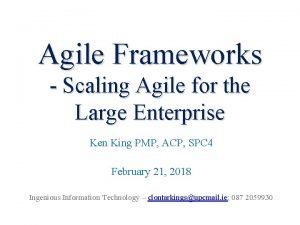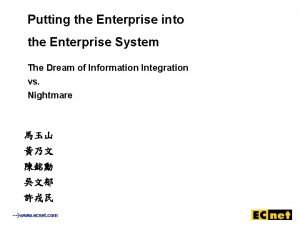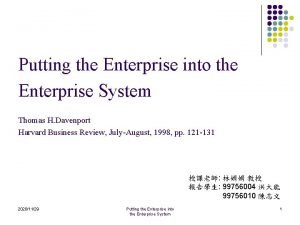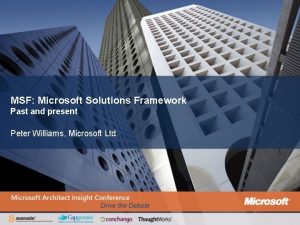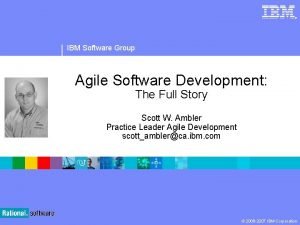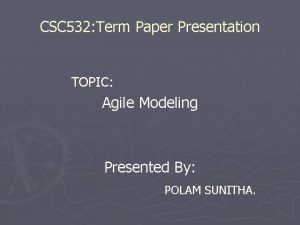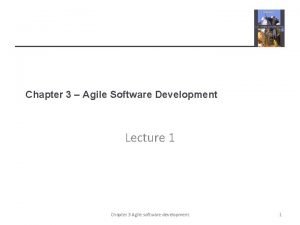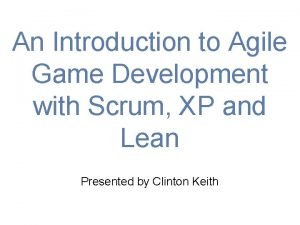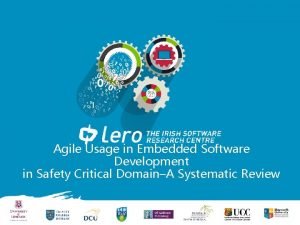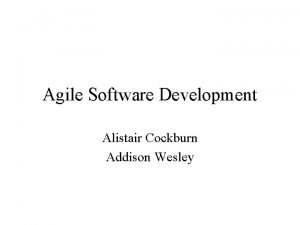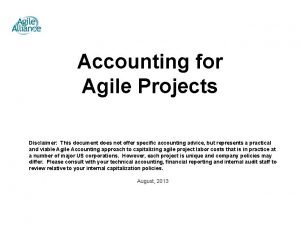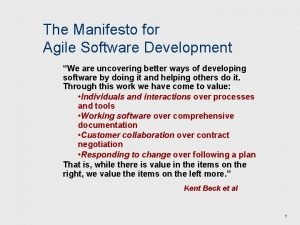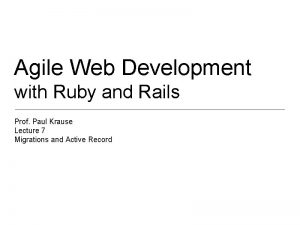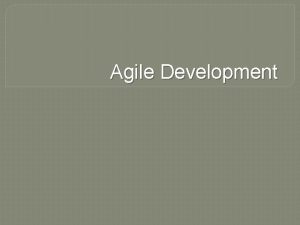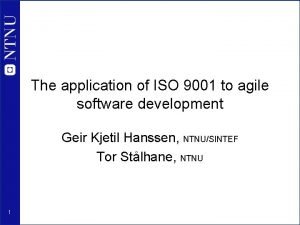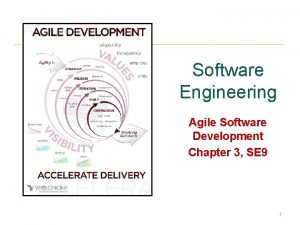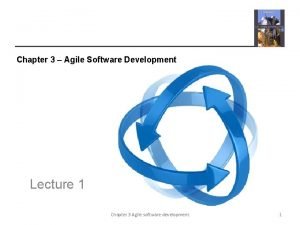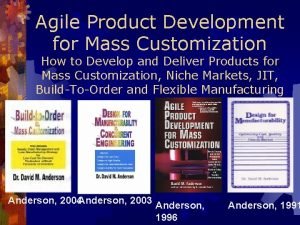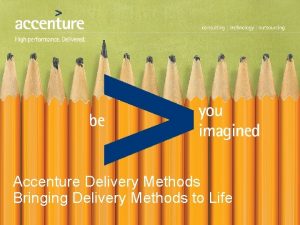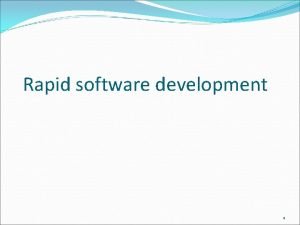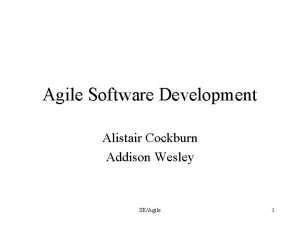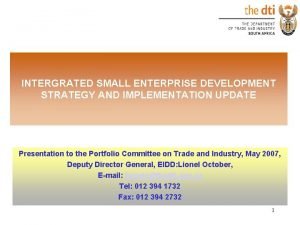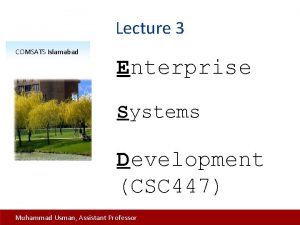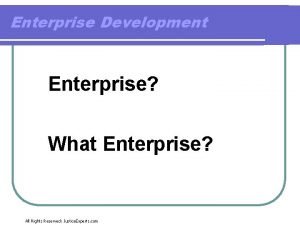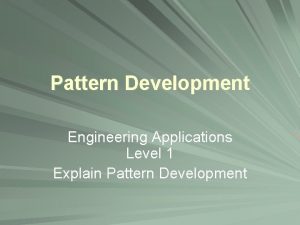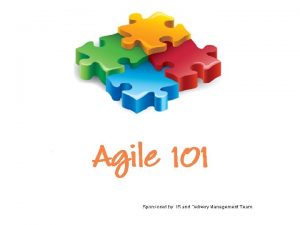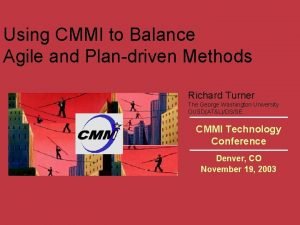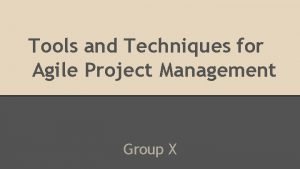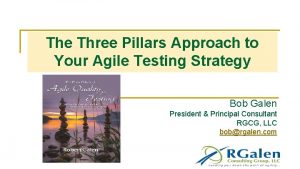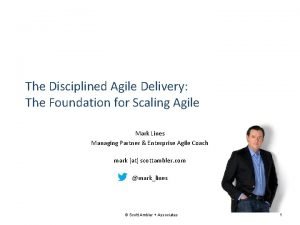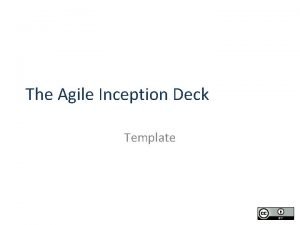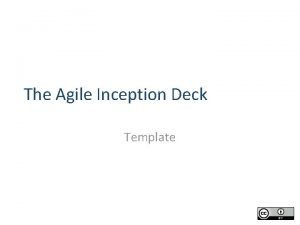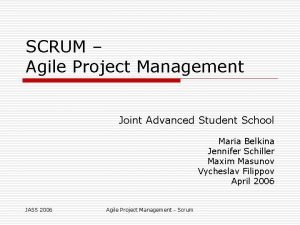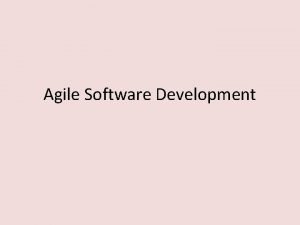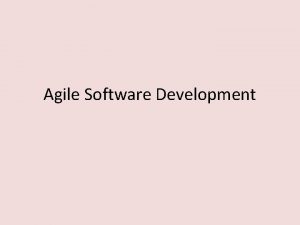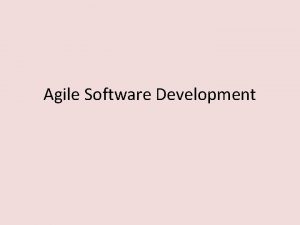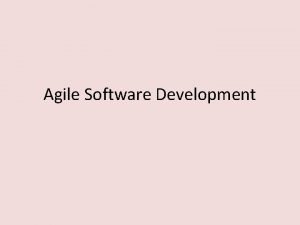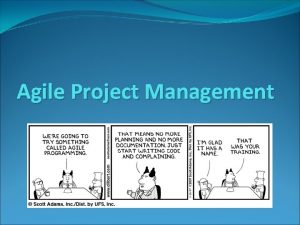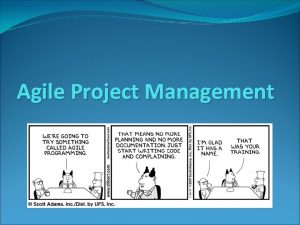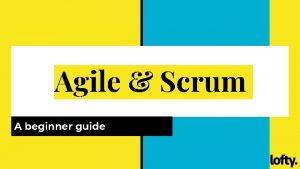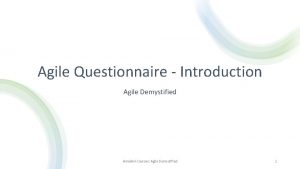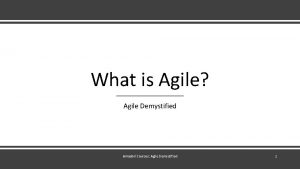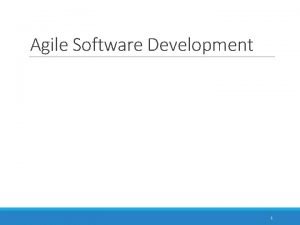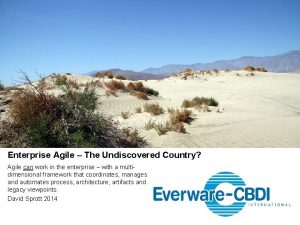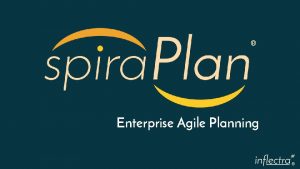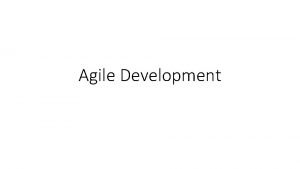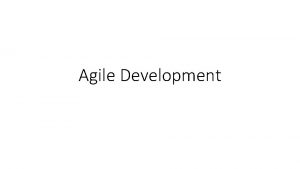From agile development to agile evolution of enterprise










































- Slides: 42

From agile development to agile evolution of enterprise systems Dr Alexander Samarin www. samarin. biz Clio S. A. Euro. Python conference 2006, CERN, Geneva, Switzerland 2006 -07 -05 1

Who am I? An enterprise solutions architect n Have always worked in the provision of IT services n From a programmer to a systems architect n Experience in academic, international and industry environments: CERN, ISO, IOC, BUPA n Have created systems which work without me n Current specialisation is improving business process management systems - effectiveness (“Do the right things”) - efficiency (“Do the things right”) 2006 -07 -05 2

Agile software development is a classic case of disruptive technology n The customers appreciate it - an order of magnitude increase in IT value for the customers - no comprehensive up-front specs - results-oriented n The IT establishment criticises it - bad or no design - no documentation - works only for top professionals 2006 -07 -05 3

My position: agile means adaptable n Agility is the ability not only to create change but to respond to change n Agility is the ability to balance flexibility and structure n Gartner: Agility is the ability of an organization to sense environmental change and to respond to it efficiently and effectively 2006 -07 -05 4

A daunting optimisation task n From a typical enterprise environment: - a complex system of systems that has grown over years - a very hostile environment for new things n To a flexible business system which is easily adaptable to: - policies, priorities, existing data, IT systems, business processes, size, complexity, budgets, culture, etc. n Subject to socio-technical aspects: - how you do something may be more important than what you do 2006 -07 -05 5

Lean production is an example of optimisation in industry n See the whole picture n Learn constantly n Decide as late as possible n Deliver as fast as possible n Eliminate waste n Empower the team n Build in integrity n Avoid sub-optimisation 2006 -07 -05 6

Harvard Business School studies: development practices that spell success n Early release of the evolving product design to customers n Daily incorporation of new software code and rapid feedback on design changes n Teams with broad-based experience of shipping multiple projects n Major investments in the design of the product architecture 2006 -07 -05 7

A dilemma n Agile software development is sound n … although there are valid criticisms (agile development is like racing a yacht and is not necessarily suited to captaining a liner) n We need it to deliver agile evolution of enterprise systems n Heuristic: sometimes it is necessary to expand the concept in order to simplify the problem 2006 -07 -05 8

The main lesson from agile development: see and understand the big picture 2006 -07 -05 9

Critical aspects for agile evolution of enterprise systems n The big picture (i. e. the enterprise architecture) is - available understood agreed internally by consensus not “parachuted” by consultants or a vendor addressing Business Process Management (BPM) n Development of the architecture for a particular enterprise should not be a project that takes many man-years and reams of pages n Business and IT use common tools 2006 -07 -05 10

Enterprise means Business Process Management n n n Business Process Management (BPM) allows you to model, automate, control, measure and optimise the flow of business process steps It spans your organisation’s systems, people, customers and partners within and beyond your corporate boundaries Gartner estimates that there are currently over 140 business process management vendors 2006 -07 -05 11

My approach to BPM (providing a fishing rod, not a fish) n n Any enterprise has its own BPM system; some enterprises want to change it An offer of an architectural framework for improving BPM systems It makes use of the synergy that exists between business needs and IT potentials Designed for agile evolution 2006 -07 -05 12

Main characteristics of the architectural framework n n n Systemic approach and adaptability Generic operational model (for business) Advanced multi-layer model (for IT) New features are added like pieces of Lego Proven that BPM systems can be improved faster, better and less expensively 2006 -07 -05 13

Typical service and process oriented enterprise Business processes Business events: requests, payments, etc. 2006 -07 -05 Dept. 14 Dept. Business events: offers, invoices, etc.

The simplified multi-layer model Execution Rules Objects Data repository 2006 -07 -05 15 repository

Why this approach produces agile systems n Many of the difficult issues are resolved: - Architecture, Methodology, Patterns n n n There is no “classic” application – instead, there is a set of orchestrated services Services those are versionable and clonable The business logic is kept in one place This approach has proven itself: production system in place for several years; several successful (easy to do) migrations undertaken 2006 -07 -05 16

Works with other technologies Portal Business intelligence services Business measurement services Business execution services Business rules services Business objects services Business data services ESB infrastructure Grid infrastructure 2006 -07 -05 17

Agile implementation of a new functionality n n n A new functionality is generally implemented across systems Any missing blocks are created in a dynamic language (e. g. Jython) and they are wrapped into services It generally does not have its "own" database It is "outside" existing systems It reuses existing services 2006 -07 -05 18

A common tool with BPMN and BPEL (e. g. www. intalio. com) 2006 -07 -05 19

Many thanks to Jython n n Excellent as the glue between enterprise applications Easy to manage (e. g. fragments are kept in. jar) Highly flexible (i. e. introspection) Dynamic loading and execution The only thing that was added: - a. py wrapper to simplify execution 2006 -07 -05 20

Real agility achieved: two types of project n Micro-projects – agile implementations of new features n Meta-projects – architectural framework governance for the management of many microprojects - looks like maintenance rather than development 2006 -07 -05 21

Meta-projects are carried out in a manner similar to Deming’s wheel n Plan - fact- and rule-based selection of what should be done next as a micro-project n Do - execution of a micro-project n Check - new findings and solutions are considered for wider use n Act - refactoring of the system 2006 -07 -05 22

Management of micro-projects n In-depth knowledge of the domain is essential n Sharing "the vision" with the business process owner n Architecting the product (i. e. a business process) in terms of IT and business systems n Guiding the project team to implement the product n Giving practical help, if necessary n Facilitate, influence and coordinate rather than control and act as the ultimate authority 2006 -07 -05 23

Micro-projects: definition phase n Business optimisations are evaluated n Features to be implemented are understood n Priorities (availability of features) are communicated 2006 -07 -05 24

Micro-projects: specification / conception phases n A prototype of a product (e. g. an executable business process diagram) is used to validate what will be implemented n Missing components (if any) are identified and specified n Missing components (if any) are evaluated; use of new tools/utilities should be justified 2006 -07 -05 25

Micro-projects: development / test / validation phases n Missing components (if any) are incrementally developed, tested and validated n Whole product is assembled from available and new (started as dummies) components n Whole product is incrementally tested, validated and deployed n Extra monitoring (if necessary) is deployed n Necessary resources are estimated and the system is reconfigured to provide them 2006 -07 -05 26

Micro-projects: production phase n New product or new version of a product is declared available for use by the business or by other components n In the case of replacement, some estimations are made when the previous version of a product is to be discontinued 2006 -07 -05 27

Typical timing of micro-projects for standards production automation n Definition phase: 1 hour n Specification / conception phases: a few hours n Development / test / validation phases: a few hours / days (depending on user’s availability) n Production phase: practically instant 2006 -07 -05 28

Address some criticisms from the following book n “Extreme Programming Refactored: The case against XP” 2006 -07 -05 29

“Extreme culture” (jumping straight to code) n There are no obstacles - General design and patterns are available Use a common tool for business process mapping Can start with the existing process and refine it A solution is firstly and quickly coded in executable business process diagramming language 2006 -07 -05 30

“The on-site customer” (as a replacement of requirements) n Close work with the customer is mandatory - It is just about changing the IT attitude towards the users - From master to service provider - From talking 95 % about IT issues and 5 % about business issues to a 50 % - 50 % balance n Follow one of the principles of the Toyota Production System (TPS): - Go and see for yourself to understand thoroughly the situation 2006 -07 -05 31

“Pair programming” (for compensating absence of design, documentation, etc. ) n From permanent pair programming to systematic code reviewing - Code review is necessary to keep conceptual integrity - Programming is a way for communication between humans - It is a good way to involve junior programmers n Follow one of the principles of the TPS: - Grow leaders who thoroughly understand the work, live the philosophy and teach it to others 2006 -07 -05 32

“Oral documentation” (documentation in XP tends to be paradoxical and confusing) n A lot of documentation is already available, but often IT rejects it: - Architectural design document is too complex Workflow diagrams are too much business Jython code requires some formal training Quality documentation (considered bureaucracy) 2006 -07 -05 33

“Constant refactoring after programming” (If it ain’t broken, fix it anyway) n Any enterprise system is never finished - Business and IT meaning of “broken” are rather different - Features are added if needed - It is a very dynamic system n Follow one of the principles of the TPS: - Become a learning organisation through relentless reflection and continual improvement 2006 -07 -05 34

Lessons learnt n Combining the architectural framework and agile software development allows building of agile enterprise systems n The use of common tools by both the business side and the IT side is of great benefit n Neither agile development nor any architecture works well if the politics don’t fly 2006 -07 -05 35

If the politics don’t fly, the system never will n Politics, and not technology, sets the limits of what technology is allowed to achieve n Cost rules n A strong, coherent constituency is essential n Technical problems become political problems n The best engineering solutions are not necessarily the best political solutions 2006 -07 -05 36

THANK YOU n Questions and answers 2006 -07 -05 37

Short description n n The aim of this talk is to share my experience in the use of a practical architectural framework for the improvement of enterprise business systems. This framework uses a dynamic language (i. e. Jython) and agile development practices. Experience with business acceptance and composition of applications are discussed. This presentation is complementary to my presentation at Plone conference 2005 in Vienna (“The use of Plone for enterprise solutions”) – it is focused on the technical and practical aspects of agile evolution of enterprise 2006 -07 -05 38

Architectural framework experience (1) n n Architectural framework provides a basis for technical and political decisions IT development is unified The target is business process automation and not applications development (brings greater flexibility) The system is built mainly from commodity functional blocks (commercial and freely available) that are not modified 2006 -07 -05 39

Architectural framework experience (2) n n n The system is built incrementally (quicker ROI) High level of user involvement Team has ownership and customizes its approach Project retrospection (no post-mortem or witch hunt) Achieve synergy between practices, principles and experiences for building software systems Take advantage of the organisational business and organisational knowledge 2006 -07 -05 40

Based on SOA: In general, a layer, a building block and a version of a building block are all services GUI (optional) WSDL Service logic Service database (optional) 2006 -07 -05 41 Other services (optional)

Micro-projects: documentation n Built-in quality management system n Use of visual tools (e. g. business process diagrams, forms) n User management, maintenance and programming n IT-specific documentation is mainly available from the meta-project and adopted patterns n Programs as documents and documents as programs 2006 -07 -05 42
 Enterprise agile frameworks
Enterprise agile frameworks Putting the enterprise into the enterprise system
Putting the enterprise into the enterprise system Putting the enterprise into the enterprise system
Putting the enterprise into the enterprise system Msf for agile software development
Msf for agile software development Ibm agile development
Ibm agile development Dilbert agile programming
Dilbert agile programming Agile model driven development amdd
Agile model driven development amdd Chapter 3 agile software development
Chapter 3 agile software development Agile game development with scrum
Agile game development with scrum Agile embedded software development
Agile embedded software development Alistair cockburn agile software development
Alistair cockburn agile software development Agile 101
Agile 101 Agile java development
Agile java development Agile software development capitalization
Agile software development capitalization The manifesto for agile software development
The manifesto for agile software development Agile development ruby
Agile development ruby Apa itu agile development
Apa itu agile development Iso 9001 software development
Iso 9001 software development Chapter 3 agile software development
Chapter 3 agile software development Chapter 3 agile software development
Chapter 3 agile software development Mass customization and rapid product development
Mass customization and rapid product development Accenture delivery suite line of business
Accenture delivery suite line of business Rapid agile development
Rapid agile development Seagile
Seagile Define community development?
Define community development? Enterprise development strategy
Enterprise development strategy Enterprise systems development
Enterprise systems development Enterprise development definition
Enterprise development definition Development that ended much development crossword
Development that ended much development crossword Describe how sheet metal is used in pattern development
Describe how sheet metal is used in pattern development Good agile team
Good agile team Agile paper airplane game
Agile paper airplane game Agile adjective
Agile adjective Lantz
Lantz Using risk to balance agile and plan driven methods
Using risk to balance agile and plan driven methods Pcmnet
Pcmnet Agile management group
Agile management group Four pillars of agile
Four pillars of agile Pmo in agile environment
Pmo in agile environment Disciplined agile delivery lifecycle
Disciplined agile delivery lifecycle Agile showcase template
Agile showcase template Inception deck template
Inception deck template Burn up chart in agile
Burn up chart in agile
